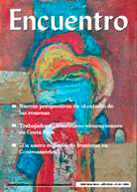DNA Database of the Nicaraguan Population: Allele Frequencies of Importance in Forensic Genetics
DOI:
https://doi.org/10.5377/encuentro.v42i87.251Resumen
Scientific-technical development in the field of natural science, specifically the discovery of human DNA polymorphism, has allowed us to identify people by their genetic fingerprint, i.e. their DNA, unique to every individual on earth. Its use in criminal investigations and forensic medicine has brought about the creation of DNA databases for discrete groups, populations and entire nations. In Nicaragua, the Molecular Biology Center of the Universidad Centroamericana has been a pioneer in this area of research, providing support for criminal investigations and resolving innumerable cases of paternity disputes. In this report we present the achievements of ten years of research, highlighting the technical aspects and, in particular, the application of the AmpFlSTR Identifiler system, as well as future prospects for scientific investigation in this area.
Keywords: AmpFlSTR Identifiler / DNA databases / genetic diversity / population genetics / Nicaragua, STRs
Descargas
Descargas
Publicado
Número
Sección
Licencia


